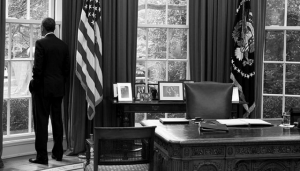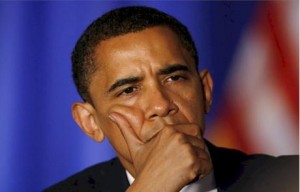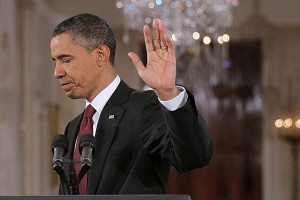Editor’s Note – Is Obama unhappy? Is he tired of being President anymore? Has he not gotten his way and now wants to take his ball and go home? Well, that is the talk we keep hearing across the board.
Here is an excellent article that delves deep into the subject and with today’s election conclusion, the question becomes – What will he feel like now, and what will he do over the next two years?
Can Obama Reboot? Does he even want to?
By GLENN THRUSH and CARRIE BUDOFF BROWN – Politico Magazine
Barack Obama is antsy. His aides can see it when he alights from Air Force One from the all-too-occasional campaign trips he has taken this fall. There’s a sigh, an unhappy-camper body language when he finds himself back in the depressing slipstream of Ebola confabs and national-security-crisis-of-the-day meetings. The vibe, according to people in his orbit, is not so much of being checked out as of being fed up.
“[I] do like campaigning. … It’s fun,” Obama said on Thursday, speaking wistfully at a rally for Democratic gubernatorial candidate Mike Michaud in Maine. But the Michaud event was the exception, not the rule. “There have been $2 billion in ads shitting on the president and no one to defend him,” a senior administration official told us. “He is very fired up to get this campaign behind him, to run through the tape.”
Obama, for so long the man with the bright future, has hated being relegated to a sidelined pariah in the midterms—even if it is the inevitable lot of a second-termer with approval ratings hovering in the low 40s—according to a dozen current and former Obama advisers we spoke with in recent days. He both resents the narrative that he’s basically irrelevant and doesn’t much relish the fact that many of his longest-serving staffers, the remnant core of his once-buzzing and brash White House, are strapping themselves to ejector seats. More than anything, Obama’s loathing for Washington, an attitude that reads as ennui to outsiders, has hardened into a sullen resignation at being trapped in a broken system he failed to change, advisers told us.
Administration officials tell us that Obama’s political and policy teams are planning a big counterattack if the Republicans win the Senate—introducing a slate of legislative proposals and executive actions on immigration, infrastructure and early childhood education that are popular with the Democratic base and that he will dare the GOP to oppose. Time and history, however, aren’t on his side. The six-month period between Election Day and next summer is likely the last chance for Obama to make his mark before the 2016 presidential campaign to succeed him really kicks into high gear. But the implacable opposition of a GOP that has turned him into his party’s albatross and his own hard-to-pin-down state of mind cast doubt on a major comeback.
Many are convinced he has already given up, more or less. “He appears tired,” says Sen. Bob Corker, a Tennessee Republican and one of the few in his party who sees himself as a potential dealmaker in a GOP-controlled Senate. “It is almost as if he is wishing for a six-year term instead of an eight-year term,” added Corker, who would ascend to the chairmanship of the Foreign Relations Committee if Republicans win the chamber. “But if he can get motivated and reenergized, I think this is a tremendous opportunity for the country.”
 Obama and his team, gearing up for one final fight, say they are intent on not throwing away the next two-plus years. West Wing officials concede that Obama is weary of the endless partisan combat and the unrelenting six-year GOP strategy of attack, but they insist he has absolutely no intention of embracing his inner lame duck. “I’m not sitting here blithely telling you we are as awesome as we can be,” said one of Obama’s top aides, laughing at his own understatement. “We’ve done a lot of good things this year but not as many as I would have liked. … We know we’re in for a shit storm if we lose the Senate. You have to gird yourself mentally ’cause you are going to come out on the other end.
Obama and his team, gearing up for one final fight, say they are intent on not throwing away the next two-plus years. West Wing officials concede that Obama is weary of the endless partisan combat and the unrelenting six-year GOP strategy of attack, but they insist he has absolutely no intention of embracing his inner lame duck. “I’m not sitting here blithely telling you we are as awesome as we can be,” said one of Obama’s top aides, laughing at his own understatement. “We’ve done a lot of good things this year but not as many as I would have liked. … We know we’re in for a shit storm if we lose the Senate. You have to gird yourself mentally ’cause you are going to come out on the other end.
“But,” the official added, with a glint of actual optimism, “you hit bottom, and then you have the Obama comeback story.”
It’s hard to see that comeback just now, what with Obama’s slow-footed responses to an array of crises and forehead-slapping lapses like his decision to play 18 holes of golf after issuing a statement condemning the American journalist James Foley’s decapitation by Islamic State militants in August. Circumstance and the innate power of the presidency could provide Obama with unanticipated opportunities, but even his closest friends are fretting about Obama’s willingness to make the changes necessary.
You know it’s bad when Obama message man emeritus David Axelrod, who almost never utters a negative word about his former boss, was publicly lamenting to Bloomberg Businessweek last month, “There’s no doubt that there’s a theatrical nature to the presidency that he resists. … Sometimes he can be negligent in the symbolism.”
The historical record provides few encouraging examples. George W. Bush, whose stumbles, of course, gave rise to Obama in the first place, offers the most hopeful recent case of a late-in-the-game turnaround, though it’s not exactly a feel-good story. After he had lost the country’s backing over the handling of the Iraq War, Bush fired his Pentagon chief, took a far more active role in the management of his White House and appointed a new chief of staff credited with rationalizing an often chaotic chain of command that had given disproportionate power to Vice President Dick Cheney. Then again, just as Bush seemed to be regaining his footing, the economy collapsed.
Bill Clinton approached the end of his presidency on a high note, standing at a 62 percent approval rating at this point in his tenure, while Obama today hovers in the 39-to-44 percent range. But times were so different as to render any comparison virtually useless: Republicans were perceived to have overreached by impeaching Clinton in the Lewinsky scandal, a move that alienated moderate swing voters, and Clinton benefited from a booming economy. “Congressional districts were a lot less polarized than they are now, and we had a bunch of Republicans who were desperate to make deals after overreaching on impeachment,” says Joel Johnson, who served as a Clinton strategist during the last two years of the administration.
Obama’s own reactions to the 2010 and 2012 elections offer signals on how he will proceed this time. After the 2010 elections, when Republicans took over the House, he tacked hard to the right, adopting the GOP agenda of deficit reduction and sealing a significant, albeit controversial, deal with Republicans to extend Bush-era tax cuts in exchange for an extension of unemployment benefits. After his 2012 reelection, he made a brief and ineffective stab at bipartisan congressional outreach and then rammed through a landmark tax increase that hiked rates for families earning more than $400,000. So far, that’s been the highlight of his second term. There might be other, more modest, deals to be had in this year’s lame-duck session of Congress, scheduled to begin later this month, but housekeeping items are more likely to dominate: clearing a backlog of nominations, extending government funding, considering Obama’s pick for attorney general.
Still, Corker said the president has a “golden opportunity” because some Republicans, like himself, are eager to prove that GOP control of both houses would create a more productive environment than the past four years of divided rule. “If he wants to leave a legacy of solving some of our nation’s issues, Tuesday could be the best thing that happens to him—if he has that attitude of wanting to do that and puts out the effort to make that happen,” Corker says.
But just as Republicans don’t trust him, neither Obama nor his top aides trust Republicans to work in good faith. Bringing in someone who could work well with congressional Republicans isn’t an idea that’s getting much traction in the West Wing, even though several people we interviewed suggested a big-splash hire—such as tapping former Senate Democratic Leader Tom Daschle for some get-it-done-on-the-Hill job. (It’s a long shot, we were told, not least of all because Daschle launched a new consulting firm just last week.)
A comeback of sorts is not an entirely crazy scenario: If there’s one thing Obama has proven as a politician, it’s that he does a lot better during a presidential election cycle than a midterm cycle, and the calendar is about to flip. Obama’s advisers (and a lot of other Democrats) believe Republican excess and the presence of a common enemy—an emboldened GOP leadership in both houses that won’t be able to resist the rightward pull of the Tea Party—will unite Democrats behind Obama in a (non-scandal-induced) version of the resurgence enjoyed by Bill Clinton.
“It is important to recognize in this election a tiny fraction of voters will vote in a handful of states that are terrible for the president,” the senior White House aide said. “There are like, two Americas—there is a midterm America and a presidential-election-year America. We would be making a big mistake, heading into a presidential election year where we are not on the ballot but our party is, to make a whole series of strategic decisions based on the politics of an electorate that will not exist two years from now.”
There’s more than a little truth to that argument: In 2014, embattled Democrats in the House, Senate and state houses could and did evade and bash their party’s leader. But in 2015 and 2016, Democrats with national aspirations, like Hillary Clinton, have to embrace Obama’s record if they hope to retain a Democratic Party core of voters who have stuck with Obama through the first-term battles and second-term disappointments.
Nevertheless, the mobilize-the-base philosophy that has defined Obama as the transcendent campaigner of his generation haunts his presidency, severely limiting his range of public support now, when he most needs to tap a wider reservoir of goodwill. Since the losses in 2010, when the Tea Party revolt redefined the game, Obama’s politics-and-metrics team has essentially conceded that he will never be able to capture anything approaching broad public support. At the start of his presidency, about 35 percent of Republicans and independents personally liked him and were willing to give him a chance. In 2014, that number is approaching the vanishing point, at around 10 percent.
The Obamaians call it the “low-ceiling/high-floor” phenomenon: With some fluctuation, Obama enjoys low-to-mid-40s support from the electorate (the Democratic base) and cast-iron mid-40s opposition from conservatives no matter what he does. In 2012, that reality catalyzed his campaign’s already robust voter mobilization efforts geared at maximizing turnout of his supporters, as opposed to selling Obama to an ever-shrinking middle of persuadable undecided voters.
But those numbers are now crushing his presidency, like the converging trash compactor walls in Star Wars, forcing him into a narrower political space than that occupied by presidents of the past. “We’ll never see 51 percent again, maybe not even 50,” predicted one of his former campaign aides.
If there’s a ray of hope—and this is the paradox of a late-stage 21st-century presidency—it’s that people will start ignoring him.
Veteran Democratic pollster Stan Greenberg says Obama’s secret weapon just might turn out to be Hillary Clinton—who could divert attention from the White House and allow him to attack multiple crises without the klieg-light scrutiny he has faced in the past. “Once Hillary becomes more important than Obama, the attention shifts,” says Greenberg, who helped advise Clinton’s husband. That’s a good thing, Greenberg argues, because Obama and his team have been so lousy about messaging what he believes to be a fundamentally competent and accomplished presidency. “I think there might be a shift to the job he’s doing versus what he’s saying about the job he’s doing. … That’s important because he’s demonstrably failed on communicating about his economic plans and on his health care reforms and on his environmental record—everything really,” Greenberg says. Scathingly, he concludes: “No one knows about any of it. … There is no part of that he has been successful at.”
So will he fire anybody? And can he still get anybody worth hiring to work for him? Already anticipating a bad election night, many Democrats and the TV pundit class have begun howling for a West Wing housecleaning, even if Obama shows no signs of doing so—though a Tuesday wipeout could change that thinking in a hurry.
For now, White House officials insist he won’t indulge in a ritual that they essentially equate to a sugar high for their critics, pleasing but fleeting. “That is not going to happen,” a senior administration official told us when asked if Obama was preparing a major staff shakeup. If anything the circle is tightening: Even central players like Axelrod, former White House senior adviser David Plouffe, Obama’s most trusted political adviser and Ex-Press Secretary Robert Gibbs—once the core of his team—have been talking to Obama less and less, and weren’t consulted on the new plan to pivot, according to a former administration official.
Yet the change is occurring whether Obama likes it or not. Many of the relatively few remaining stalwarts on the White House staff are exhausted, eager to resume normal lives and leaving. White House chief of staff Denis McDonough asked senior aides around Labor Day to tell him if they are going to stick around for the final two years, and he has been reaching out to possible replacements since then. Among those mentioned as likely departures are some of Obama’s closest aides: senior adviser Dan Pfeiffer and deputy national security adviser Ben Rhodes. Senior counselor John Podesta, who committed to staying only a year and is expected to play a major role in Hillary Clinton’s 2016 campaign, is scheduled to leave after the elections as well.
A list of people most likely to replace the departed isn’t easy to draw up, not with the lure of a Clinton campaign, big cash in the private sector, the perception of insularity and resistance to outsiders and the run-of-the-mill reality that winding down a presidency is a thankless, enervating business. Over the summer, many West Wingers and Obama alums believed that the president’s former senior adviser David Plouffe, Obama’s closest political aide, was primed to return as chief of staff. Plouffe forcefully denied the rumor to anyone who asked—and recently took a highly compensated job as a senior executive with Uber, the on-demand car service.
“One of the problems with a White House late in the second term is you’re not getting the A team,” said Martha Joynt Kumar, a Towson University political science professor and expert on the presidency. “You have weak people in positions and a lot of pressures at the very end.”
White House officials acknowledged that attracting top talent will be a challenge, but they pointed to the return of Ron Klain, a former chief of staff to Vice President Joe Biden who is now Obama’s Ebola czar, as evidence that the president is still a draw. (Klain is eventually expected to move into the job held by Podesta or Pfeiffer, if he leaves.)
Yet even the Klain hire offers a glimpse into the dysfunction that hampers Obama as he heads into the homestretch. Klain, according to several current and former Obama insiders, was passed over twice for White House chief of staff because Obama wasn’t quite willing to admit him to the innermost circle of trust. For a brief period in early 2013, Klain had the inside track for the job over McDonough, but he was done in over concerns that he had leaked private conversations with the president to journalists—including an unflattering blow-by-blow of a 2012 debate prep session that appeared in Double Down by John Heilemann and Mark Halperin. (Klain and White House officials declined to comment for this story, but he has denied those charges to Obama’s staffers.)
Whatever his previous misgivings, Obama—at the urging of his former chief of staff Rahm Emanuel and others—decided that Klain was simply too talented (and necessary) to keep outside the building at this point.
But Democrats close to the White House argue that there need to be many more Klains, not just to replace empty slots, but also to restock Obama’s inner circle with the kind of fiery, assertive, contentious advisers who energized the presidency—and the president—during the first term.
As one former Obama aide said, “It’s good they are opening the process up, but isn’t it too little, too late?”
___________________
Glenn Thrush is senior staff writer at Politico Magazine.
Carrie Budoff Brown is senior White House reporter at Politico.


